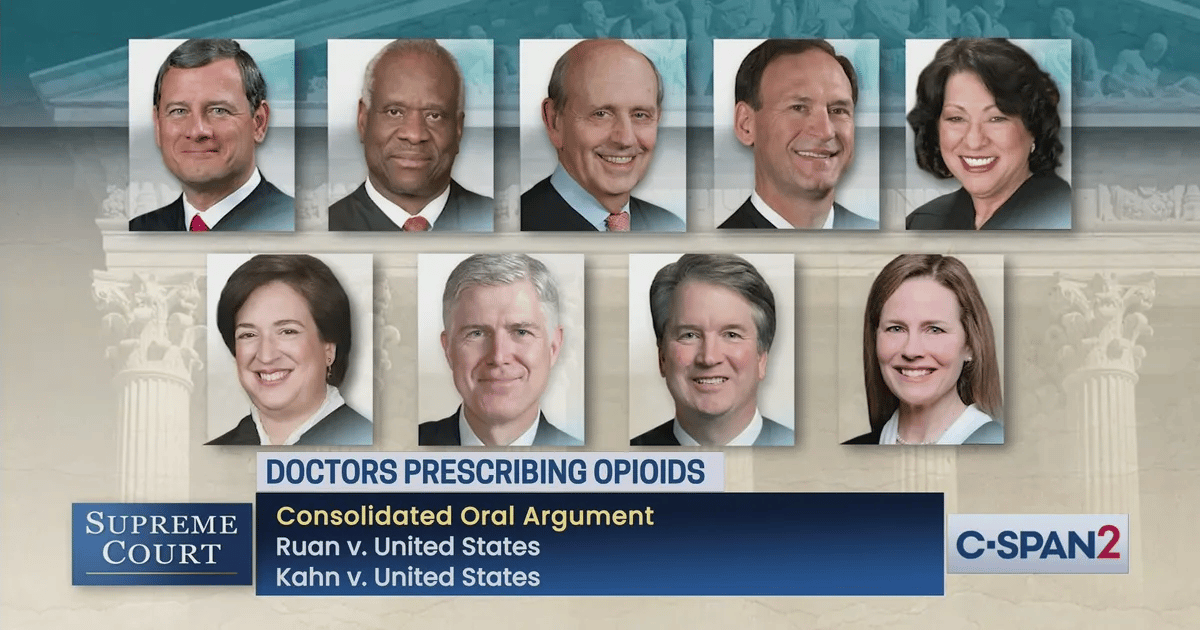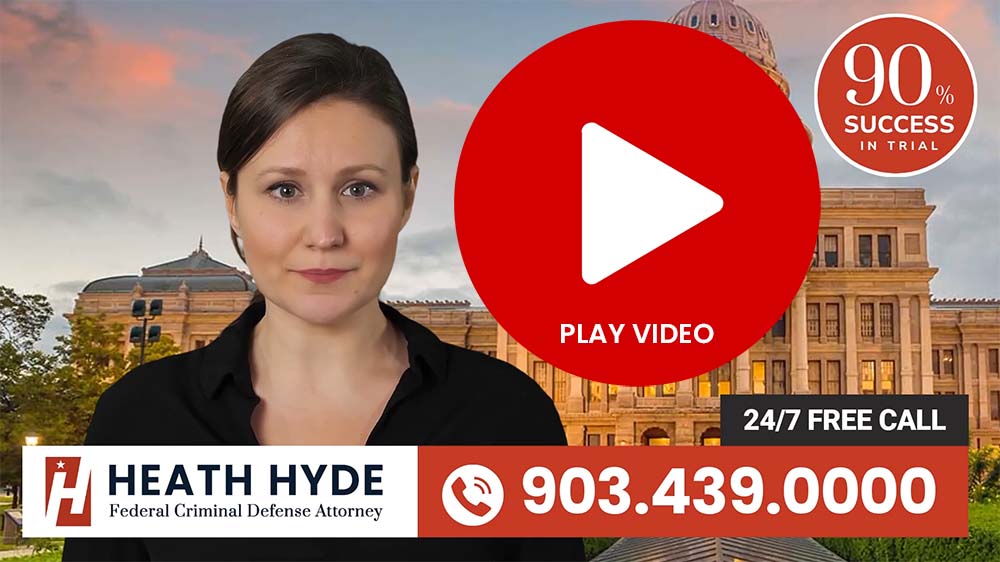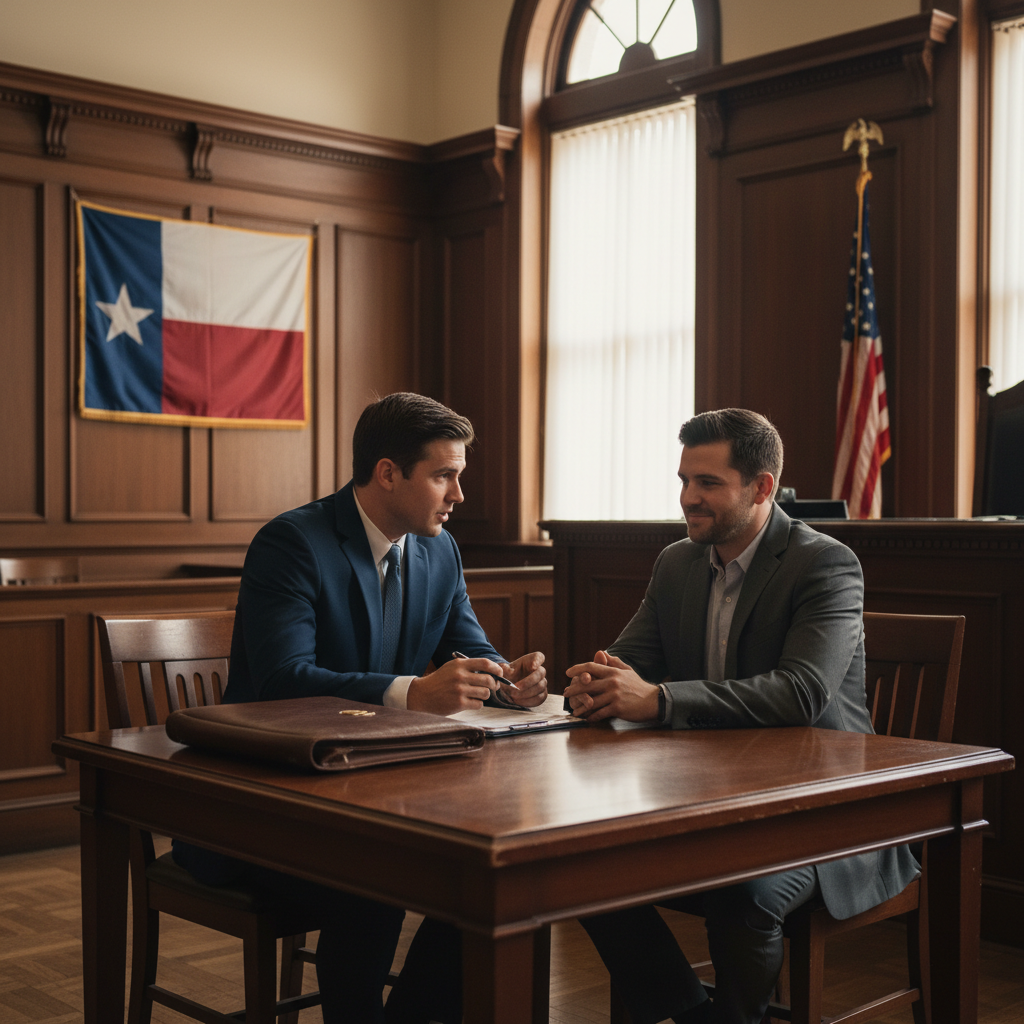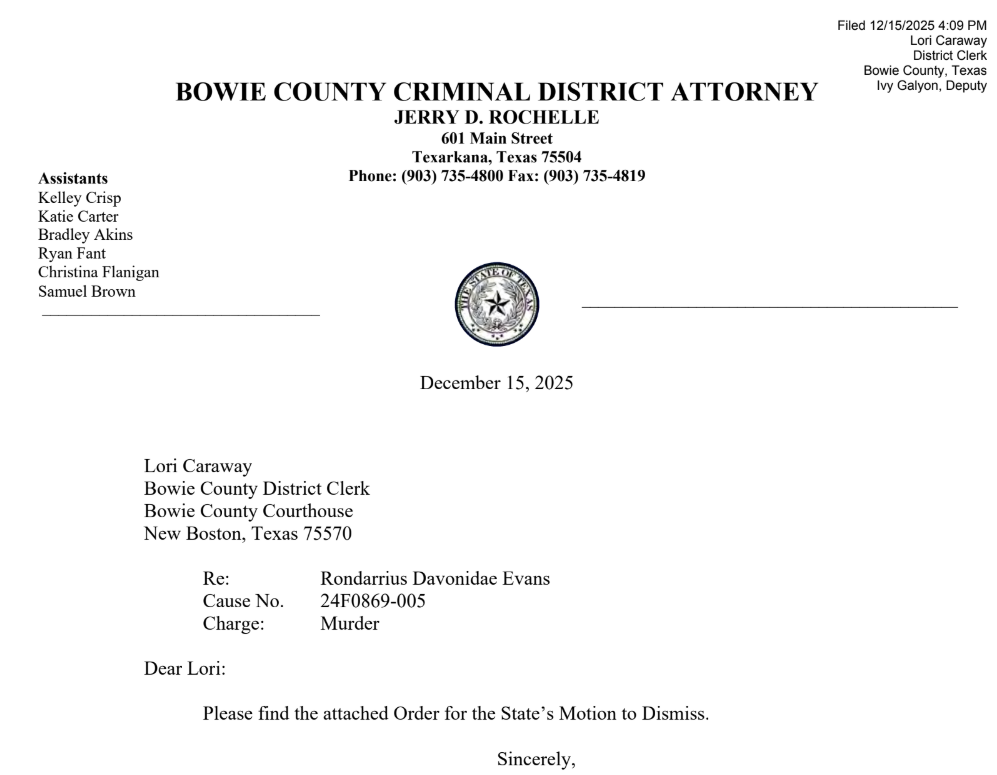Learn more about Ruan v. United States case from SCOTUS blogs with Heath Hyde and see how it could affect Doctor’s Pill Mill criminal cases.
Ruan v. United States Overview
Consolidated with: Kahn v. United States
Linked with: Couch v. United States
| Docket No. | Op. Below | Argument | Opinion | Vote | Author | Term |
|---|---|---|---|---|---|---|
| 20-1410 | 11th Cir. | Mar 1, 2022 | Jun 27, 2022 | 9-0 | Breyer | OT 2021 |
Holding: For the crime of prescribing controlled substances outside the usual course of professional practice in violation of 21 U.S.C. § 841, the mens rea “knowingly or intentionally” applies to the statute’s “except as authorized” clause.
Judgment: Vacated and remanded, 9-0, in an opinion by Justice Breyer on June 27, 2022. Justice Alito filed an opinion concurring in the judgment, in which Justice Thomas joined and in which Justice Barrett joined as to Parts I-A, I-B, and II.
| Date | Proceedings and Orders (key to color coding) |
|---|---|
| Apr 05 2021 | Petition for a writ of certiorari filed. (Response due May 7, 2021) |
| Apr 27 2021 | Motion to extend the time to file a response from May 7, 2021 to June 7, 2021, submitted to The Clerk. |
| Apr 28 2021 | Motion to extend the time to file a response is granted and the time is extended to and including June 7, 2021. |
| May 07 2021 | Brief amici curiae of Professors of Health Law and Policy filed. |
| May 27 2021 | Motion to extend the time to file a response from June 7, 2021 to July 7, 2021, submitted to The Clerk. |
| May 28 2021 | Motion to extend the time to file a response is granted and the time is further extended to and including July 7, 2021. |
| Jul 07 2021 | Brief of respondent United States of America in opposition filed. VIDED. |
| Jul 20 2021 | Reply of petitioner Xiulu Ruan filed. (Distributed) |
| Jul 21 2021 | DISTRIBUTED for Conference of 9/27/2021. |
| Oct 04 2021 | DISTRIBUTED for Conference of 10/8/2021. |
| Oct 12 2021 | DISTRIBUTED for Conference of 10/15/2021. |
| Oct 25 2021 | DISTRIBUTED for Conference of 10/29/2021. |
| Nov 01 2021 | DISTRIBUTED for Conference of 11/5/2021. |
| Nov 05 2021 | Petition GRANTED. The petition for a writ of certiorari in No. 21-5261 is granted. The cases are consolidated, and a total of one hour is allotted for oral argument. |
| Nov 05 2021 | Because the Court has consolidated these cases for briefing and oral argument, future filings and activity in the cases will now be reflected on the docket of No. 20-1410. Subsequent filings in these cases must therefore be submitted through the electronic filing system in No. 20-1410. Each document submitted in connection with one or more of these cases must include on its cover the case number and caption for each case in which the filing is intended to be submitted. Where a filing is submitted in fewer than all of the cases, the docket entry will reflect the case number(s) in which the filing is submitted; a document filed in all of the consolidated cases will be noted as “VIDED.” |
| Dec 08 2021 | Blanket Consent filed by Petitioner, Xiulu Ruan |
| Dec 17 2021 | ARGUMENT SET FOR Tuesday, March 1, 2022. VIDED. |
| Dec 17 2021 | Brief amicus curiae of Pacific Legal Foundation filed (in 20-1410). |
| Dec 20 2021 | Brief of petitioner Xiulu Ruan filed (in 20-1410). |
| Dec 20 2021 | Joint appendix filed (in 20-1410). (Statement of costs filed) |
| Dec 20 2021 | Joint appendix filed (in 21-5261). (Statement of costs filed) |
| Dec 20 2021 | Brief of petitioner Shakeel Kahn filed (in 21-5261). |
| Dec 21 2021 | Record requested from the U.S.C.A. 11th Circuit. |
| Dec 21 2021 | Brief amicus curiae of Compassion & Choices filed. VIDED. |
| Dec 22 2021 | The record from the U.S.C.A 11th Circuit is electronic and located on Pacer |
| Dec 23 2021 | Brief amici curiae of Professors of Health Law and Policy filed (in 20-1410). |
| Dec 27 2021 | Amicus brief of Physicians Against Abuse not accepted for filing. (Corrected version submitted – February 15, 2022). |
| Dec 27 2021 | Brief amicus curiae of Physicians Against Abuse filed (in 20-1410) (1/15/2022). (Distributed) |
| Dec 27 2021 | Brief amicus curiae of Due Process Institute filed (in 20-1410). |
| Dec 27 2021 | Brief amicus curiae of Cato Institute filed (in 20-1410). |
| Dec 27 2021 | Brief amici curiae of Association of American Physicians and Surgeons and Jeffrey A. Singer, M.D. filed (in 20-1410). |
| Dec 27 2021 | Brief amicus curiae of National Pain Advocacy Center filed. VIDED. |
| Dec 27 2021 | Brief amicus curiae of National Association of Chain Drug Stores in support of neither party filed. VIDED. |
| Dec 27 2021 | Brief amicus curiae of Chamber of Commerce of the United States of America in support of neither party filed. VIDED. |
| Dec 27 2021 | Brief amicus curiae of National Association of Criminal Defense Lawyers filed. VIDED. |
| Dec 27 2021 | Brief amicus curiae of Anmol Singh Kamra filed. VIDED. |
| Dec 27 2021 | Brief amici curiae of Stephen J. Ziegler, et al. filed (in 20-1410). |
| Jan 18 2022 | CIRCULATED |
| Jan 19 2022 | Brief of respondent United States filed. VIDED. (Distributed) |
| Jan 24 2022 | Motion for divided argument filed by petitioners. VIDED. |
| Feb 17 2022 | Reply of petitioner Shakeel Kahn filed (in 21-5261). (Distributed) |
| Feb 18 2022 | Motion for divided argument filed by petitioners GRANTED, and the time is divided as follows: 15 minutes for petitioner in in No. 20-1410 and 15 minutes for petitioner in No. 21-5261. VIDED. |
| Feb 18 2022 | Reply of petitioner Xiulu Ruan filed (in 20-1410). (Distributed) |
| Mar 01 2022 | Argued. For petitioner in 20-1410: Lawrence S. Robbins, Washington, D. C. For petitioner in 21-5261: Beau B. Brindley, Chicago, Ill. For respondent: Eric J. Feigin, Deputy Solicitor General, Department of Justice, Washington, D. C. VIDED. |
| Jun 27 2022 | Judgment VACATED and case REMANDED. Breyer, J. delivered the opinion of the Court, in which Roberts, C. J., and Sotomayor, Kagan, Gorsuch, and Kavanaugh, JJ., joined. Alito, J., filed an opinion concurring in the judgment, in which Thomas, J., joined, and in which Barrett, J., joined as to Parts I–A, I–B, and II. VIDED. |
| Jul 29 2022 | JUDGMENT ISSUED |
Ruan v. United States Consolidated Oral Argument

Subjective Intent of Wrongdoing Required To Convict Doctors Under Controlled Substances Act
By Abbe R. Gluck on Jun 28, 2022 at 10:15 am
With a majority opinion that will be one of Justice Stephen Breyer’s last for the Supreme Court, the court on Monday ruled 9-0 that two alleged opioids “pill mill” doctors could not be convicted absent a jury finding that they subjectively believed they were wrongfully dispensing pills. The opinion is a victory for physicians prescribing innovative treatments that they believe serve legitimate medical purposes, and it should assuage concerns about a ruling that could have chilled more doctors from prescribing needed pain treatments. Even in the midst of a historic opioid crisis, and an intensely fractured Supreme Court term, the justices found common ground in longstanding presumptions of criminal law and the core principle of physician discretion.
The case, Ruan v. United States, was a challenge to jury instructions in two prosecutions of doctors accused of prescribing outside the bounds of ordinary medical practice. The Controlled Substances Act makes it unlawful, “except as authorized,” to “knowingly or intentionally” distribute controlled substances. One of those exceptions is for physicians who operate under the statute’s registration scheme; registered doctors may prescribe controlled substances in accordance with rules promulgated by the attorney general. The rule at issue in this case allows doctors to dispense a controlled substance that is “issued for a legitimate medical purpose by an individual practitioner acting in the usual course of his professional practice.”
The question was whether a doctor’s subjective intent in prescribing matters. In arguing a subjective standard is required, the charged doctors and other advocates emphasized longstanding rules about the presumption of mens rea (a guilty state of mind) for criminal offenses. The United States, in contrast, argued for an objective standard, on the ground that the act “does not permit a physician to simply decide for himself that any manner or volume of drug distribution is ‘medicine.’”
The court ruled for the doctors, with Breyer writing for six justices, and Justice Samuel Alito concurring in the judgment on behalf of himself, Justice Clarence Thomas and, in part, Justice Amy Coney Barrett. Breyer’s opinion makes quick work of grammar-oriented arguments that pervaded oral argument — namely, the contention that, because the phrase “except as authorized” comes before “knowingly and intentionally” in the CSA, no mens rea requirement applies to the exceptions.
Referencing a “a longstanding presumption, traceable to the common law, that Congress intends to require a defendant to possess a culpable mental state,” Breyer opined that “we expect, and indeed usually want, doctors to prescribe the medications that their patients need.” A mens rea requirement, the opinion holds, is essential to separate physicians’ “socially beneficial conduct” from criminal conduct.
Alito’s opinion reaches the same result but through a different pathway. He argues that the “except as authorized” provision sets forth an affirmative defense, not an element of the crime. He therefore objects to both the application of a mens rea presumption and also the court’s view that the government bears the burden to prove, beyond a reasonable doubt, that the defendant did not qualify for the statutory exception.
Instead, Alito would have left the burden on the defendant to prove that they fell into the exception authorizing dispensation or, in the alternative, apply only a preponderance-of-the-evidence burden to the government. In so doing, Alito relied on precedent from the CSA’s predecessor statute, the Harrison Narcotics Act of 1914, which utilized a “good faith” standard to evaluate physician prescribing.
These differences may prove important for future debates about burdens of persuasion with respect to affirmative defenses, but for purposes of this case, the bottom lines of both opinions were in agreement: A subjective standard, not an objective one, should be applied to doctors who are charged with violations of the CSA’s controlled-substances provision. Alito described this “good faith” requirement as one that makes the relevant standard quite different from mere negligence and malpractice. He wrote: To act in good faith “‘as a physician’ does not invariably mean acting as a good physician, as an objective understanding of the ‘in the course of professional practice’ standard would suggest.
A doctor who makes negligent or even reckless mistakes in prescribing drugs is still ‘acting as a doctor’ — he or she is simply acting as a bad doctor. The same cannot be said, however, when a doctor knowingly or purposefully issues a prescription to facilitate addiction and recreational abuse.” Breyer’s majority opinion reaches essentially the same result, but puts a much higher burden on the government.
None of this is to say that the court has let pill mill doctors off the hook. In this case, the government alleged that defendant Dr. Xiulu Ruan’s clinic improperly issued more than 300,000 prescriptions for controlled substances over a four-year period; that he was one of the top prescribers in the nation of a type of fentanyl, an extremely potent synthetic opioid approved to treat breakthrough pain in cancer patients; and that he tied his prescribing practices to his own financial interests.
The other petitioner, Dr. Shakeel Kahn, is alleged to have sold controlled substances in exchange for cash — and even firearms sometimes — without performing any exam and documenting the encounters with falsified notes.
What the court held is that juries must scrutinize whether charged physicians actually believed their behavior was legitimate rather using an objective standard of a hypothetical reasonable physician. And Breyer was clear that circumstantial evidence might be important to such an inquiry. That may make prosecutions of some outliers difficult, but good government lawyering should smoke out dishonest doctors who are not acting as doctors at all. The cases were remanded for scrutiny of the jury instructions under the clarified standard.

Amid Overdose Crisis, Court Will Weigh Physician Intent in “Pill Mill” Prosecutions and More Under the Controlled Substances Act
By Abbe R. Gluck on Feb 28, 2022 at 10:02 am
In the midst of a national opioid crisis that claimed more than 100,000 lives in this country over the past year, the Supreme Court will hear a case on Tuesday about the relevance of doctors’ subjective intentions in criminal prosecutions for unlawful distribution of controlled substances. While on the surface, the case, Ruan v. United States, may appear to be an ordinary “pill mill” case, the decision could have a much broader impact on the practice of medicine as well as doctrines of criminal intent.
The Controlled Substances Act makes it unlawful for “any person knowingly or intentionally … to manufacture, distribute, or dispense” a controlled substance, “[e]xcept as authorized by this subchapter.” One of those exceptions is for physicians who operate under the statute’s registration scheme; registered doctors may prescribe controlled substances in accordance with rules promulgated by the attorney general.
The rule at issue in this case allows doctors to dispense a controlled substance that is “issued for a legitimate medical purpose by an individual practitioner acting in the usual course of his professional practice.” The question is whether a doctor’s subjective intent — namely, whether she prescribed in good faith — is relevant to applying that standard.
Two doctors who were convicted of violating the CSA say subjective intent is critical. The United States, in contrast, argues for an objective standard, on the ground that the act “does not permit a physician to simply decide for himself that any manner or volume of drug distribution is ‘medicine.’”
Dr. Xiulu Ruan, one of the petitioners, was a board-certified interventional pain specialist who the government alleges operated an Alabama “pill mill” — a term used to describe doctors, clinics, or pharmacies that prescribe or dispense high volumes of powerful narcotics inappropriately.
Ruan’s clinic, the government says, improperly issued more than 300,000 prescriptions for controlled substances over a four-year period. Ruan is also alleged to have been one of the top prescribers in the nation of a type of fentanyl, an extremely potent synthetic opioid approved to treat breakthrough pain in cancer patients, and to have tied his prescribing practices to his own financial interests, including to manufacturers in whose companies he had purchased stock and to the drugs available in the pharmacy he and his partner owned.
The other petitioner, Dr. Shakeel Kahn, is alleged to have sold controlled substances in exchange for cash and even firearms in Arizona and Wyoming, sometimes without performing any exam and documenting the encounters with falsified notes.
Both doctors vigorously contest the allegations, saying they “at all times” believed in good faith they were prescribing for legitimate medical purposes. Ruan emphasizes the government’s own statements that in many cases he did serve his patients well, while acknowledging the government’s claim that he could have been more careful, e.g., by supervising staff more closely or spotting red flags. The doctors argue, however, that there is a difference between criminal activity and malpractice, and the critical difference, they contest, is the presence of culpable intent. Their appeals center on challenges to their jury instructions, which they argue did not properly emphasize this good-faith component.
The government argues, in contrast, that the physician must show she has made an “objectively reasonable good-faith effort to learn and comply with medical norms.” The doctors respond that the government’s standard would criminalize innocent mistakes and chill the practice of medicine, including medical innovations that federal law permits doctors to engage in; for instance, the federal government does not generally prevent doctors from prescribing drugs approved by the Food and Drug Administration for unapproved, “off-label” uses. The government responds that its standard will not reach mistakes or off-label prescribing, as long as the physician makes the “honest effort to practice medicine as conventionally understood.”
The briefs run through a litany of legal arguments, ranging from the longstanding background presumption that mens rea — a guilty state of mind — is necessary to establish a crime; to federalism-grounded arguments that the government’s standard works an improper expansion of federal authority into the practice of medicine, the regulation of which is traditionally left to the states; to arguments based on text, legislative history, and precedent.
Ruan and Kahn, among other things, train on the words “knowingly or intentionally” in the CSA, as well as the fact that the key phrase in the rule — “an individual practitioner acting in the usual course of his professional practice” — uses the term “his,” which they argue demands an individualized inquiry, not that of the generic reasonable physician.
They also argue that Congress, elsewhere in the CSA, meaningfully deviated from the “knowingly or intentionally” language to impose a lower standard for certain actions undertaken “knowingly or recklessly,” thereby showing that Congress knew how to criminalize merely reckless behavior when it wanted to.
The government, in turn, focuses on the structure of the CSA — the words denoting mens rea, “knowingly or intentionally,” come after the exception clause at issue and so, the government argues, do not apply to it. The government also focuses on, among other things, the rule’s use of the word “usual” in the phrase “usual course of his professional practice,” arguing that “usual” connotes the ordinary, objective, everyday norms of medical practice, not doctors effectively deciding for themselves the scope of their own criminal liability.
While at first glance the case may seem relatively straightforward, it raises issues for health care, regulation, and criminal law that extend beyond the opioid crisis and the dramatic facts presented in these particular prosecutions. As a result, a variety of different bedfellows have filed amicus briefs in support of a clearer culpability standard, some on the side of the doctors, others on the side of neither party, perhaps in the hope that the court will be able to articulate a compromise rule or at least clarify the existing standard.
In the health care context, in addition to the arguments already noted, amici argue that the government’s objective standard criminalizes what should be understood and addressed as mere careless prescribing. The objective standard, they argue, will dangerously chill the practice of medicine in general and have especially detrimental effects on the practice of pain medicine. Medicine, they contend, is by nature iterative, and the science of pain medicine in particular continues to evolve.
(As one example, outside commentators have noted that the Centers for Disease Control and Prevention earlier this month issued a draft revision of its opioid-prescribing guidelines that would, among other things, relax dosing caps.)
Further, as a result of the opioid crisis and the ensuing increase in regulation and enforcement, amici point out that many physicians have stopped prescribing opioids altogether, or have stopped interacting with patients in populations likely to present issues of pain and substance-use disorder. It has thus become much harder for patients in need to find pain medicine for legitimate chronic pain, including pain caused by cancer and the end-of-life.
A group of health law professors also focus on novel medical therapies, arguing that doctors need “discretion to deploy their specialized training and expertise to pioneer new treatment approaches that may improve patients’ well-being.” They also doubt the ability of lay juries, confronted with battles of the experts, to fairly judge this scientific landscape and determine when under an objective standard a doctor has done enough to learn and conform her behavior to usual practice. Instead, Ruan and Kahn endorse a standard that “separates physicians operating at the fringes of medical innovation from those who abandon medicine entirely to engage in conventional drug dealing and trafficking.”
In this regard, it is interesting to note that the leading precedent the government relies on is United States v. Moore, an early CSA decision in which the Supreme Court confirmed that “registered physicians can be prosecuted under the CSA when their activities fall outside the usual course of professional practice.” The Moore court affirmed the conviction of a doctor experimenting with novel uses of methadone to treat patients with substance-use disorder.
The jury was instructed that it could find guilt if the defendant had not acted in “good faith” with “an honest effort” to comply with “an accepted standard of medical practice.” But Moore aimed to answer the question of whether physician-registrants could be convicted under Section 841 in the first place — it answered that question in the affirmative; the opinion did not delve deeply into the jury instruction. The precedent therefore leaves open some question about how experimental therapies should be treated.
The government describes Moore as relevant to only “plainly out-of-bounds” practices, and relies on the case for the proposition that “a doctor cannot claim an innocent mind when he opts to remain ignorant of medical conventions or deems himself above them.”
Other amici focus on mens rea, including a brief from the Chamber of Commerce arguing that a “strong mens rea” requirement that includes “statutory willfulness” is especially important for “complex regulatory schemes,” where there can be confusion about what constitutes wrongdoing, and where there are risks of overdeterrence of beneficial activity.
Notably, the Chamber’s argument to thus limit the reach of criminal law extends beyond the CSA; its brief singles out, for instance, some cases in the environmental law context where the Chamber contends a subjective mens rea standard should likewise apply. Others question whether the CSA provides sufficient guidance to prevent the Drug Enforcement Administration or the attorney general, as opposed to Congress, from setting out the contours of criminal liability.
Ruan concludes his brief arguing, as a fallback to his preferred rule, that a doctor “must be acquitted if he honestly tried to meet reasonable professional standards.” The government argues throughout its own brief that the version of the “honest effort” standard it advocates provides the necessary mens rea, contending that a doctor who “makes no reasonable effort to respect professional norms, and thereby elevates his own notions of medical practice to the point where other doctors would not describe them as such, does not have an innocent mind.” It’s possible the court will focus on this potential middle ground to navigate the complexities of this landscape.
In a moment when civil opioid litigation is sprawling in courts around the country — with cases brought by more than 2,000 local governments pending in the multidistrict federal litigation in Cleveland, hundreds more brought in state courts or by state attorneys general across the country, and the leading manufacturer Purdue Pharma mired in a contested bankruptcy proceeding in New York — there can be no doubt about the extraordinary complexity of using litigation as a response to a public health crisis.
And while criminal prosecutions relating to the crisis have garnered fewer headlines, they are still significant. Federal prosecutors have opened criminal probes into six major opioid makers and distributors, and Purdue pleaded guilty to federal charges in October 2020. The outcome of Ruan will almost certainly have an effect on physician behavior and the approach of federal prosecutors to similar questions in the future.
Read more SCOTUS blogs in Merits Cases
SCOTUS Cases: Ruan v. United States, Kahn v. United States
Contact Heath Hyde Today for Health Care Fraud Defense
Heath Hyde is one of the top federal lawyers in the United States helping clients avoid investigation and prosecution in health care fraud allegations lodged by whistleblowers (Qui Tam). Contact Heath Hyde at 903.439.0000 for a confidential case evaluation or submit your case via our website.






